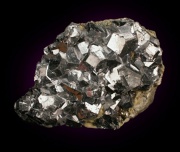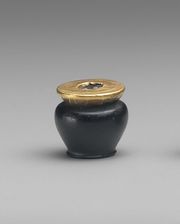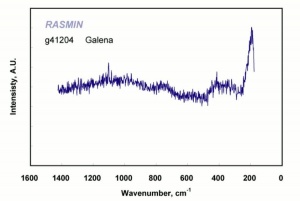Galena
Description
A gray metallic-like mineral composed of Lead sulfide. Galena commonly occurs as cubic crystals. It is the principal ore source for metallic Lead and often contains significant amounts of Silver. Galena is mined from deposits in Canada, Mexico, England (Cornwall), Australia (Broken Hill), Germany (Clausthal Zellerfeld), Italy, Germany, Romania, Austria, France, Spain, Chile, Peru, Africa, and in the United States (Missouri, Illinois, Iowa, Idaho, Wisconsin, Oklahoma, Kansas, Colorado, California). When crushed, lead sulfide is a black powder. In ancient Egypt, it was known as 'kohl' and was used as a cosmetic. Powdered galena was also used in glazes for medieval pottery and 17th century slipware. In the mid 20th century, it was used as a semiconductor in crystal radio sets. Lead sulfide is still used in some ceramic glazes and as a source for the production of Lead sulfate.
Synonyms and Related Terms
galenite; lead glance; lead sulfide; plumbus sulfide; Bleiglanz (Deut.); Galenit (Deut.); galène (Fr.); galaniet (Ned.); galena (Esp., Port.); galeniet (Ned.)
Risks
Toxic by inhalation or ingestion. Skin contact may cause irritation or ulcers. Carcinogen, teratogen, suspected mutagen.
Fisher Scientific: MSDS
Physical and Chemical Properties
Soluble in nitric acid and hot, dilute hydrochloric acid. Insoluble in water.
Isometric crystal system with cubic crystals. Cleavage=perfect in three directions.
Luster = metallic. Streak = gray. Fracture = subconchoidal, brittle
| Composition | PbS |
|---|---|
| CAS | 1314-87-0 |
| Mohs Hardness | 2.5 |
| Density | 7.4-7.6 g/ml |
| Molecular Weight | mol. wt. = 239.27 |
Resources and Citations
- Mineralogy Database: Galena
- G.S.Brady, Materials Handbook, McGraw-Hill Book Co., New York, 1971 Comment: p. 443
- C.W.Chesterman, K.E.Lowe, Audubon Society Field Guide to North American Rocks and Minerals, Alfred A. Knopf, New York, 1979
- Richard S. Lewis, Hawley's Condensed Chemical Dictionary, Van Nostrand Reinhold, New York, 10th ed., 1993
- Henry Hodges, Artifacts: An Introduction to Early Materials and Technology, Ronald P. Frye, Kingston, Canada, 1988
- Van Nostrand's Scientific Encyclopedia, Douglas M. Considine (ed.), Van Nostrand Reinhold, New York, 1976
- Random House, Webster's Encyclopedic Unabridged Dictionary of the English Language, Grammercy Book, New York, 1997
- The Merck Index, Martha Windholz (ed.), Merck Research Labs, Rahway NJ, 10th edition, 1983 Comment: entry 5445
- Encyclopedia Britannica, http://www.britannica.com Comment: "galena" [Accessed December 11, 2001
- Wikipedia: http://en.wikipedia.org/wiki/Galena (Accessed Sept. 7, 2005)
- Susan E. Schur, Conservation Terminology: A review of Past & Current Nomenclature of Materials, Technology and Conservation, Spring (p.34-39); Summer (p.35-38); Fall (p.25-36), 1985
- Michael McCann, Artist Beware, Watson-Guptill Publications, New York City, 1979
- CRC Handbook of Chemistry and Physics, Robert Weast (ed.), CRC Press, Boca Raton, Florida, v. 61, 1980 Comment: density=7.3-7.6


